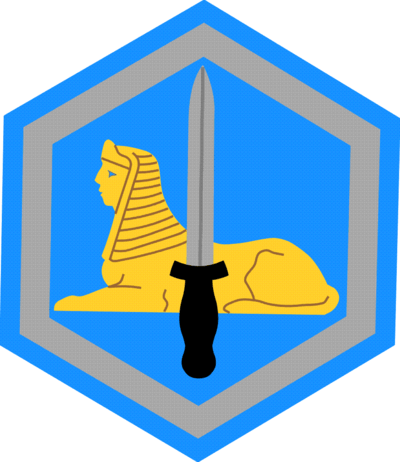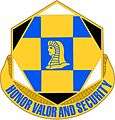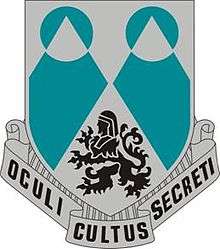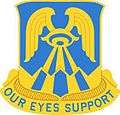66th Military Intelligence Brigade
The 66th Military Intelligence Brigade ("Six-Six-M-I" and 66th MIB) is a United States Army brigade, subordinate to United States Army Intelligence and Security Command and based at Wiesbaden Army Airfield, Wiesbaden, Germany.[1] After years of history as a counter intelligence/intelligence group with headquarters in Munich and geographically dispersed detachments, it became a brigade on 16 October 1986, but was inactivated in July 1995. Reformed again as an intelligence group in 2002, it became a brigade again in 2008.
| 66th Military Intelligence Brigade | |
|---|---|
 66th MIB shoulder sleeve insignia | |
| Active | 1986–1995 2008–present |
| Country | |
| Branch | |
| Part of | United States Army Intelligence and Security Command |
| Installation | Clay Kaserne, Germany |
| Motto(s) | Power Forward |
| Battle honours | World War II |
| Commanders | |
| Current commander | COL Bryan E. Hooper |
| Insignia | |
| Distinctive unit insignia |  |
The unit's mission is to provide intelligence support to U.S. Army Europe [2] and U.S. Army Africa.[3] Part of the 66th Military Intelligence Brigade supports near real-time missions for deployed soldiers such as operations in Afghanistan [4] and also Iraq. Members of the brigade provide mission support by utilizing databases running on computer clusters and communicate on encrypted networks, such as the NSA-certified TACLANE encrypted network.[5]
The 66th MIB includes the 2nd Military Intelligence Battalion. Soldiers of the 66th MIB can be individually attached to other U.S. Army units in the course of their duties. Members are also on duty at U.S. Air Force installations, such as RAF Mildenhall. One brigade soldier was killed in action near a Forward Operating Base in Afghanistan in 2010.[6] Unit members analyze sources in, among other languages, Russian and Persian.
Soldiers in the brigade ideally hold qualifications in military intelligence and counter-intelligence, depending on their specific roles. Some also hold military (NWC, NDU, AFSC etc.) and/or civilian academic degrees. Entrance and intermediate training of military intelligence personnel is provided by the United States Army Intelligence Center at Fort Huachuca, Arizona.
Organization
- 66th Military Intelligence Brigade




Misconduct in the past
- Soldiers of 66th MI Brigade have been involved in various degrees at the detention facility of Abu Ghraib (interrogation, analysis, witnessing detainee abuse).[7]
Leadership
The current head of the unit is the Brigade Commander, COL Bryan E. Hooper.[8]
Shoulder sleeve insignia
Description
On a silver gray hexagon, one point up, with a 1⁄8 inch (0.32 cm) oriental blue border 3 inches (7.6 cm) in height and 2 5⁄8 inches (6.7 cm) in width overall, an oriental blue hexagon bearing a yellow sphinx superimposed by a silver gray dagger hilted black.
Symbolism
Oriental blue and silver gray, representing loyalty and determination, are the colors of the Military Intelligence branch. Yellow/gold symbolizes excellence. The hexagon borders reflect the numerical designation of the unit. The sphinx, a traditional military intelligence symbol, indicates observation, wisdom and discreet silence. The unsheathed dagger reflects the aggressive and protective requirements and the element of physical danger inherent in the mission of the unit.
Background
The shoulder sleeve insignia was approved on 27 August 1987 for the 66th Military Intelligence Brigade. It was cancelled on 17 July 2002. The insignia was reinstated effective 18 June 2003 and redesignated as an exception to policy for the 66th Military Intelligence Group, with description and symbolism updated. (TIOH Drawing Number A-1-740)[9]
Distinctive unit insignia
Description
A Gold color metal and enamel device 1 3⁄16 inches (3.0 cm) in width overall consisting of a hexagon composed of a chequy of (6) Black and White sections (one angle up), surmounted throughout by a smaller hexagon (flat side up) composed of a chequy of nine sections of Gold and Blue (oriental) with the center square charged with a Gold sphinx head, facing to the right, all above a Gold scroll inscribed "HONOR VALOR AND SECURITY" in Blue (Oriental) letters.
Symbolism
The black and white symbolize enlightenment and knowledge both day and night around the world. The chequy represents the unit's tactical and strategic capabilities in counterintelligence. The sphinx is a traditional intelligence symbol and indicates observation, wisdom and discreet silence. The hexagon within a hexagon "6-6" further distinguishes the numerical designation of the organization.
Background
The distinctive unit insignia was originally approved for the 66th Military Intelligence Group on 16 July 1969. It was redesignated for the 66th Military Intelligence Brigade on 8 October 1986. The insignia was redesignated effective 16 October 2002, with the description updated, for the 66th Military Intelligence Group.[9]
Lineage
Constituted 21 June 1944 in the Army of the United States as the 66th Counter Intelligence Corps Detachment.
Activated 1 July 1944 at Camp Rucker, Alabama.
Inactivated 12 November 1945 at Camp Kilmer, New Jersey.
Activated 10 November 1949 in Germany.
Allotted 20 September 1951 to the Regular Army.
Reorganized and redesignated 20 December 1952 as the 66th Counter Intelligence Corps Group.
Reorganized and redesignated 1 January 1960 as the 66th Military Intelligence Group.
Redesignated 25 July 1961 as the 66th Intelligence Corps Group.
Redesignated 15 October 1966 as the 66th Military Intelligence Group.
Reorganized and redesignated 16 October 1986 as Headquarters and Headquarters Company, 66th Military Intelligence Brigade.
Reorganized and redesignated 16 October 1992 as Headquarters and Headquarters Detachment, 66th Military Intelligence Brigade.
Inactivated 16 July 1995 in Germany.
Redesignated 28 February 2002 as Headquarters and Headquarters Detachment, 66th Military Intelligence Group.
Activated 16 October 2002 in Germany.[10]
Redesignated July 2008 as the 66th Military Intelligence Brigade.[11]
See also
- Defense Clandestine Service
- Battlefield Surveillance Brigade, The United States Army is currently reorganizing its intelligence formations into Battlefield Surveillance Brigades (BfSB)
- 205th Military Intelligence Brigade (United States)
- TACLANE, Network encryption device developed by NSA
- Patch Barracks (Stuttgart), hosts Special Operations Command, Europe and NSA/CSS Representative Europe office (NCEUR)
- Keith B. Alexander, former director of NSA, acted in command position in Germany with 66th MI Group.
External links
References
- "66th MI Public Website". Retrieved 28 March 2012.
- "Units and Commands, Organizational chart of U.S. Army Europe". US Army. Archived from the original on 22 April 2012. Retrieved 18 April 2012.
- "New 66th MI commander 'powers forward'". Herald Union. Archived from the original on 4 October 2013. Retrieved 27 March 2012.
- "66th MI Soldiers are INSCOM's best". US Army. Retrieved 27 March 2012.
- "Local Employment Opportunities" (PDF). Archived from the original (PDF) on 5 October 2013. Retrieved 28 March 2012.
- "INSCOM honors fallen Soldier". US Army INSCOM. Retrieved 27 March 2012.
- "Fay Report: Investigation of Intelligence Activities at Abu Ghraib" (pdf). findlaw.com. pp. 40, 79, 125, 128. Retrieved 10 April 2012.
- http://www.inscom.army.mil/MSC/66MIB/command.html
- "66th Military Intelligence Group". The Institute of Heraldry. Archived from the original on 14 September 2012. Retrieved 2 July 2011.
- "Lineage and Honors of the 66th Military Intelligence Brigade". U.S. Army Center for Military History. Archived from the original on 23 May 2011. Retrieved 2 July 2011.
- "66th MI Public Website". U.S. Army INSCOM. Retrieved 25 March 2012.